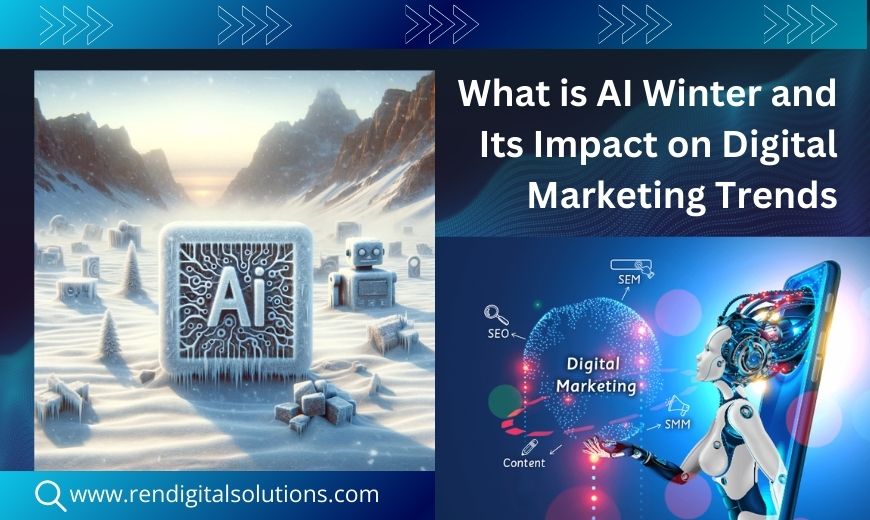
Artificial Intelligence (AI) has transformed numerous industries, including digital marketing, where it plays a pivotal role in reshaping strategies and enhancing efficiency. However, despite the promise of AI, there have been periods of decline in AI research and funding, known as AI winters. These phases of reduced interest and investment in AI have had significant impacts on various sectors, including digital marketing. In this blog, we will explore what is AI winter, what is AI and what is not, and how AI winter affects digital marketing trends.
What is AI Winter?
AI winter refers to periods in the history of artificial intelligence when interest, funding, and progress in AI research significantly decline. These phases are typically characterized by unmet expectations, where the hype surrounding AI fails to materialize into practical applications or economic value. During an AI winter, funding for AI research is reduced, public interest wanes, and progress in AI technologies slows down.
The concept of AI winter has occurred multiple times since the inception of AI research in the 1950s. The first major AI winter occurred in the 1970s, when early AI programs failed to deliver on their promises, leading to a decline in funding and interest. Another significant AI winter happened in the late 1980s and early 1990s, following the collapse of expert systems and the disillusionment with AI’s capabilities.
What is AI and What is Not?
Before diving deeper into AI winter and its impact on digital marketing, it’s essential to clarify what is AI and what is not. AI involves creating computer systems capable of executing tasks that normally require human intelligence. These tasks encompass learning, reasoning, problem-solving, natural language comprehension, and environmental perception.
AI spans multiple subfields, such as machine learning, natural language processing, computer vision, and robotics. Machine learning, for example, involves training algorithms to learn patterns from data and make predictions or decisions without explicit programming. Natural language processing enables computers to understand and generate human language, while computer vision allows machines to interpret and process visual information.
However, not everything that is automated or involves data processing qualifies as AI. Simple automation, such as rule-based systems or basic data analysis, does not fall under the umbrella of AI. AI involves more sophisticated processes that mimic human cognitive functions.
The Role of AI in Digital Marketing
AI has become an integral part of digital marketing, transforming how businesses interact with their audiences, analyze data, and optimize campaigns. Here are some of the primary ways AI is applied in digital marketing:
- Personalization: AI enables marketers to deliver personalized experiences to users by analyzing their behavior, preferences, and interactions. This includes personalized content recommendations, targeted ads, and customized email campaigns.
- Predictive Analytics: AI-powered predictive analytics allows marketers to forecast trends, customer behavior, and campaign performance. By analyzing historical data, AI algorithms can predict future outcomes, helping marketers make informed decisions.
- Chatbots and Customer Service: AI-driven chatbots provide instant customer support, answering queries and resolving issues in real time. These chatbots leverage natural language processing to interpret and address customer questions.
- Content Creation: AI tools are capable of producing various types of content, including product descriptions, social media updates, and even full-length articles. While AI-generated content may not replace human creativity, it can help marketers scale their content production.
- Ad Optimization: AI algorithms optimize ad placements and targeting by analyzing user data and predicting the best-performing ad formats, audiences, and channels.
How Does AI Winter Affect Digital Marketing Trends?
Now that we understand what is AI winter and its role in digital marketing, let’s explore how AI winters impact digital marketing trends:
- Slowdown in AI-Powered Innovations: During an AI winter, the pace of innovation in AI-driven digital marketing tools may slow down. Companies may reduce investment in AI research and development, leading to fewer advancements in AI-powered marketing technologies. Marketers who rely heavily on cutting-edge AI tools may find that new features and improvements become less frequent during these periods.
- Budget Reallocation: As interest and funding for AI research decline during an AI winter, companies may reallocate their budgets to other areas. In digital marketing, this could mean a shift away from AI-driven campaigns and tools toward more traditional marketing methods. Marketers may need to adapt by focusing on non-AI strategies or finding cost-effective AI solutions.
- Shift in Industry Focus: AI winters often lead to a shift in focus within the industry. During these periods, companies may prioritize other emerging technologies or strategies over AI. For digital marketers, this could mean exploring alternatives such as blockchain, augmented reality (AR), or virtual reality (VR) as new ways to engage with audiences.
- Talent Shortages: AI winters can also lead to talent shortages in the AI field. As funding and interest in AI decline, fewer professionals may pursue careers in AI research and development. This talent shortage can impact digital marketing teams that rely on AI expertise to implement and optimize AI-driven campaigns.
- Changing Customer Expectations: During an AI winter, customer expectations around AI-powered experiences may shift. If AI-driven personalization, chatbots, or other tools become less effective or less prevalent, customers may adjust their expectations accordingly. Marketers need to stay attuned to these changes and ensure their strategies align with evolving customer preferences.
- Increased Skepticism: AI winters often lead to increased skepticism about the effectiveness of AI technologies. Marketers may face challenges in convincing stakeholders or clients of the value of AI-driven strategies. To counter this skepticism, marketers should focus on showcasing tangible results and ROI from AI-powered campaigns.
- Opportunities for Differentiation: While AI winters present challenges, they also offer opportunities for differentiation. Marketers who continue to invest in AI during these periods may gain a competitive edge as their competitors pull back. By staying ahead of the curve and leveraging AI effectively, businesses can stand out in a crowded market.
Conclusion
In conclusion, understanding what is AI winter and what is AI and what is not is crucial for digital marketers navigating the ever-evolving landscape of technology. While AI winters present challenges, they also offer opportunities for innovation and differentiation. By staying informed and adaptable, marketers can continue to harness the power of AI to drive success in their digital marketing strategies.
At REN Digital Solutions, we are committed to helping businesses navigate the complexities of AI and digital marketing. Whether you’re looking to implement AI-driven campaigns or explore alternative strategies, our team of experts is here to guide you every step of the way.
Our Top Services
- Best Social Media Marketing Services in Ghaziabad
- Digital Marketing in Crossings Republik
- Best Email Marketing Service In Ghaziabad
- Web Designing Service in Ghaziabad Republik
- Best Digital Marketing Service in Dwarka
Read Also: Boost Your Data Skills with Looker Studio Qwik Start



